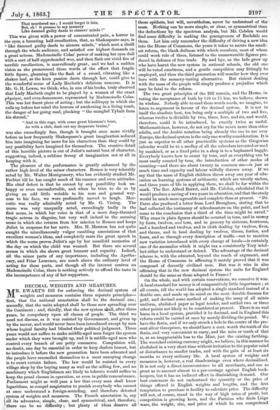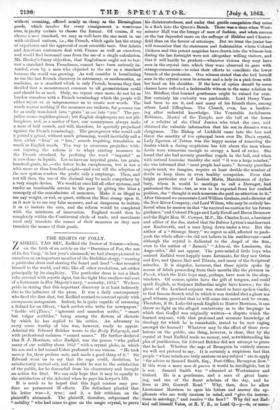DECIMAL WEIGHTS AND MEASURES.
MR. EWART'S Bill for enforcing the decimal system of weights and measures contains three separate principles— first, that the national annotation shall be the decimal one ; secondly, that the units adopted shall be those now spreading over the Continent ; and, thirdly, that the new system gtall, after three years, be compulsory upon all classes of people. The third we need not discuss, as it was resisted by Government, and given up by the mover, and would never have been introduced except by men whose logical faculty had blinded their political judgment. Three years would not suffice to make middle-aged men forget the system under which they were brought up, and it is middle-aged men who control every branch of our petty commerce. Compulsion will, no doubt, one day be essential in order to keep dealers honest, but to introduce it before the new generation have been educated and the people have reconciled themselves to a most annoying change is to court certain failure. The law would be resisted in every village shop by the buying many as well as the selling few, and no machinery which Englishmen are likely to tolerate would suffice to keep the penal clauses in operation, or even in public remembrance. Parliament might as well pass a law that every man shall know logarithms, as compel magistrates to punish everybody who cannot at once understand a foreign-sounding, and therefore detested system of weights and measures. The French annotation is, say all its advocates, simple, clear, and symmetrical, and, therefore, there can be no difficulty ; but plenty of ideas deserve all those epithets, but will, nevertheless, never be understood of the mass. Nothing can be more simple, or clear, or symmetrical than the deductions by the spectrum analysis, but Mr. Cobden would find some difficulty in making the greengrocers of Rochdale see them. Let him only remember the difficulty of driving a new idea into the House of Commons, the years it takes to secure the small- est reform, the blank dullness with which members, most of whom could work rule of three, listened to the unanswerable figures pro- duced in defence of free trade. By and bye, as the lads grow up who have learnt the new system in national schools, the old one will be voted cumbrous, and a gentle compulsion may fittingly be employed, and then the third generation will wonder how they ever bore with the memory-taxing alternative. But violent dealing with the mass of the people will simply produce a prejudice which may be fatal to the reform.
The two great principles of the Bill remain, and the House, in voting the acceptance of both by 1l0 to 75 has, we believe, shown its wisdom. Nobody able to read these words needs, we imagine, to listen to argument in favour of the decimal system. It is not in itself the absolute best, ten being only a multiple of two and five, whereas twelve is divisible by two, three, four, and six, and would, therefore, could it be introduced, be exactly twice as useful. Mathematicians, however, do not cry for the moon more than other adults, and the Arabic notation being already the one in use over Europe, the decimal system is the only one worthy consideration. It is just as superior to all other practicable systems as the Gregorian calendar would be to a medley of all the calendars invented or used by mankind, or as a fixed price in a shop is to a haphazard haggle. Everybody knows how to count by tens, and as everything can be most easily counted by tens, the introduction of other modes of counting—and there are about twenty in common use—is just so much time and capacity and labour wilfully thrown away. If we say that the mass of English children throw away one year of edu- cation on learning systems of arithmetic which are utterly useless, and three years of life in applying them, we shall be far within the mark. The Rev. Alfred Barret, said Mr. Cobden, calculated that it would produce a saving of two years in education, and that the study would be much more agreeable and complete than at present. "Dr. Farre also produced a letter from Lord Brougham, stating that he had collected the testimony of schoolmasters on the point, and had come to the conclusion that a third of the time might be saved." Why sums in plain figures should be counted in tens, and in money by fours, twelves, and tens, and in grocery by sixteens, fourteens, and a hundred and twelves, and in cloth dealing by twelves, fives, and threes, and in land dealing by twelves, threes, forties, and fours, and so through every description of traffic—not to mention new varieties introduced with every change of locale—is certainly one of the anomalies which it might tax a consistently Tory intel- lect either to understand or defend. The advantage of the decimal scheme is, with the educated, beyond the reach of argument, and the House of Commons in affirming it merely proved that it was composed of decently civilized men. But was it wise in also affirming that in the new decimal system the units for England should be the same as those adopted in France?
On the whole, and with certain reservations, we conceive it was. A local standard for money is of comparatively little importance ; at all events, till the world has adopted a single standard instead of a double one, and made up its mind on the most durable fineness for gold, and devised some method of making the assay of all mints uniform, abolished paper as legal tender, and settled two or three other points not likely to be considered at present. There is no real harm in a local system, provided it be decimal, and in England this reform could be carried at once by merely dividing the pound. We have the florin, and if we only struck a hole in the centre of the pre- sent silver threepence, we should have a cent. worth the tenth of the florin, and very convenient to carry, and the mite or tenth of that is, at an inappreciable loss to the Mint, just the existing farthing.
The wretched existing currency might, we believe, in this manner be abolished in a very short time without irritation to the popular mind or disturbance to smaller trades, and with the gain of at least six months to every ordinary life. A local system of weights and measures is, however, a real disadvantage even where decimalized. It is not only a direct inconvenience to all merchants, and one so great as to amount almost to a per-centage against English book- keepers, but it has an indirect effect in diminishing demand. Our best customers do not understand the quantity or the price of things offered in English weights and lengths, and the first temptation to purchase is facility to calculate price. The difficulty will not, of course, stand in the way of high rates of profit, but competition is growing keen, and the Parisian who finds Liege ware, the weight, size, and price of which he can comprehend
without counting, offiered nearly as cheap an the. Birmingham goods, which involve for every consignment a wearisome sum, is pretty certain to choose the former. Of course, if we choose a new standard, we may as well have the one most in use with civilized nations, i.e , the French, which again has the stamp of experience and the approval of most scientific men. Our Asiatic and American customers deal with. France as well as ourselves, and. would find increased ease from the use of a single calculation. Mr. Henley's funny objection, that Englishmen ought not to bor- row a standard from Frenchmen, cannot have been seriously in- tended, even by a man who objected to the arc as a standard because the world was growing. As well consider it humiliating to Use the last French discovery in astronomy, or mathematics, or medicine, as a standard which is only French, because they first decided that a measurement common to all geometricians could and should be so used. Only, we repeat once more, do not let us burden ourselves with a French terminology which the people will either reject or so mispronounce as to create new words. The words matter nothing if the measures are uniform, for gramme can be as easily translated into " grain " as oui into "yes." The pre- judice seems unphilosophical ; but English shopkeepers axe not phi- losophers, and, as a matter of fact, our countrymen always make a mess of half sounds, and will, therefore, be specially prejudiced against the French terminology. The greengrocer who would call a pound a pfund, without much grimacing, would inevitably call a here either "liver" or " leev," sounds requiring translation as much as English words. The way to overcome prejudice with- out injuring the reform is to adapt existing measures to the French standard, by prefixing the word " imperial " as is now done in liquids. Let us have an imperial grain, ten grain, hundred-grain, &c.,—the latter looks cacophonous, but is not a whit more so than hundred-weight—and wait till the adoption of the new system renders the prefix only a surplusage. Then, and not till then, the use of the decimal may be made compulsory by a very simple device. We would at once kill all other systems, and render an inestimable service to the poor by giving the Mint a monopoly of the manufacture of measures. Make it as illegal to use any weight, or rod, or quart, without the Mint stamp upon it, as it now is to use any false measure, and as dangerous to imitate it as to imitate the coin, and the reform would be completed -with the minimum of innovation. England would then be completely within the Continental circle of trade, and merchants need only translate the names of their measures as they now translate the names of their goods.































 Previous page
Previous page